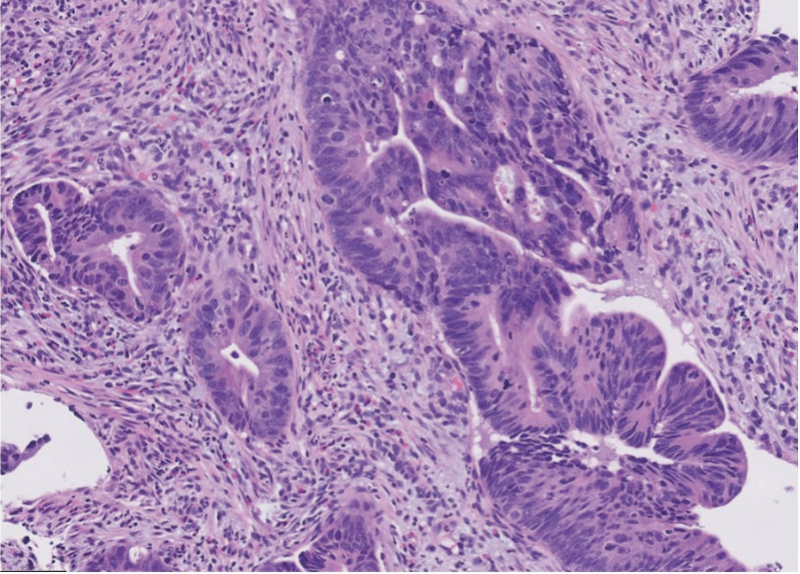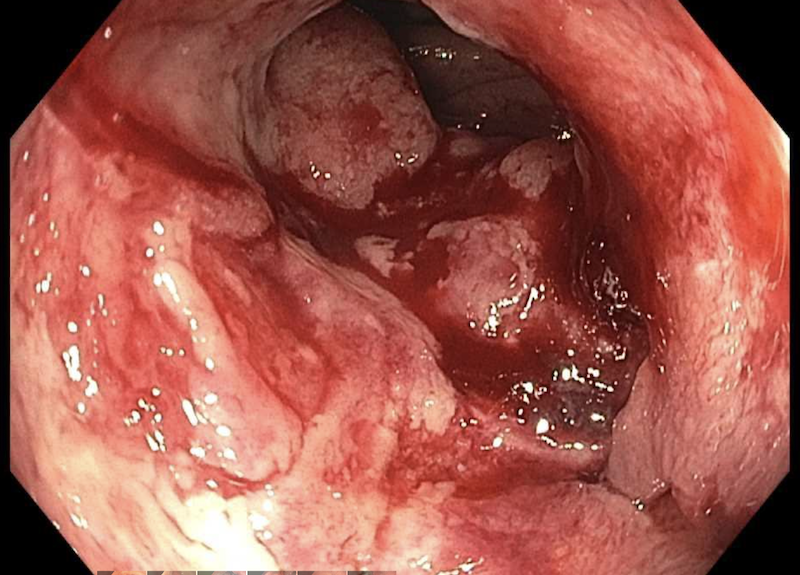Sunday Poster Session
Category: Colon
P0366 - A Positive Pregnancy Test Prior to Colonoscopy: Elevated Beta-HCG in Advanced Colorectal Cancer

Anna Simons, DO
Baylor Scott & White Medical Center
Temple, TX
Presenting Author(s)
Baylor Scott & White Medical Center, Temple, TX
Introduction:
While positive beta-human chorionic gonadotropin (b-HCG) more commonly indicates pregnancy, germ cell tumors, or trophoblastic disease it is less commonly associated with non-gynecological tumors. We report a case of a 47-year-old female with an abnormal qualitative urine b-HCG pregnancy test found to have stage IV rectosigmoid adenocarcinoma.
Case Description/
Methods:
A 47-year-old female with past medical history of tobacco use, chronic iron deficiency anemia, and family history of colon polyps and ovarian cancer presented for colonoscopy. Patient denied hematochezia, melena, abdominal pain, or night sweats, but she did report unintentional weight loss of 43 pounds over 15 months. Physical exam was grossly normal. Laboratory data showed chronic iron deficiency anemia but was otherwise normal. Prior to the procedure, the patient underwent routine pregnancy screening and 2 out of 3 qualitative urine pregnancy tests resulted as borderline positive. The patient was not sexually active and denied the possibility of pregnancy. Colonoscopy revealed a partially obstructing circumferential mass located ~15 cm above the anal verge spanning 4 cm in length. Pathology confirmed moderately differentiated adenocarcinoma. Computed tomography of the chest, abdomen and pelvis revealed hypodense hepatic masses and a few scattered sub-4 mm pulmonary nodules. The imaged gynecologic structures were unremarkable for age and without evidence of pregnancy, gynecologic tumors or obvious trophoblastic disease. Biopsy of the liver lesion confirmed metastatic adenocarcinoma consistent with primary colorectal malignancy. She is currently undergoing neoadjuvant chemotherapy with tentative plans for surgery.
Discussion:
In pregnancy, b-HCG increases progesterone production to enhance the endometrial lining and maintain the pregnancy. B-HCG can also promote cell invasion and tumor growth via the epithelial mesenchymal transition pathway to promote metastasis. As a result, b-HCG positive colorectal cancers (CRC) tend to be more advanced with a poorer prognosis. Data on the incidence and survival outcomes of b-HCG positive CRC are limited. B-HCG positivity has been reported in up to 20% of CRC cases; however, quantitative data on long-term outcomes is sparse. Small-scale studies suggest a 5-year survival rate of 21% in b-HCG-positive CRC, compared to 62% in b-HCG-negative cases. Further research is needed to better define the incidence, prognostic significance, and clinical outcomes associated with b-HCG expression in CRC. 
Figure: Figure 2: moderately differentiated adenocarcinoma.
Figure: Figure 1: circumferential rectosigmoid mass on colonoscopy.
Disclosures:
Anna Simons indicated no relevant financial relationships.
Anupama Ancha indicated no relevant financial relationships.
Christopher Williams indicated no relevant financial relationships.
Anna Simons, DO, Anupama Ancha, MD, Christopher Williams, MD. P0366 - A Positive Pregnancy Test Prior to Colonoscopy: Elevated Beta-HCG in Advanced Colorectal Cancer, ACG 2025 Annual Scientific Meeting Abstracts. Phoenix, AZ: American College of Gastroenterology.
